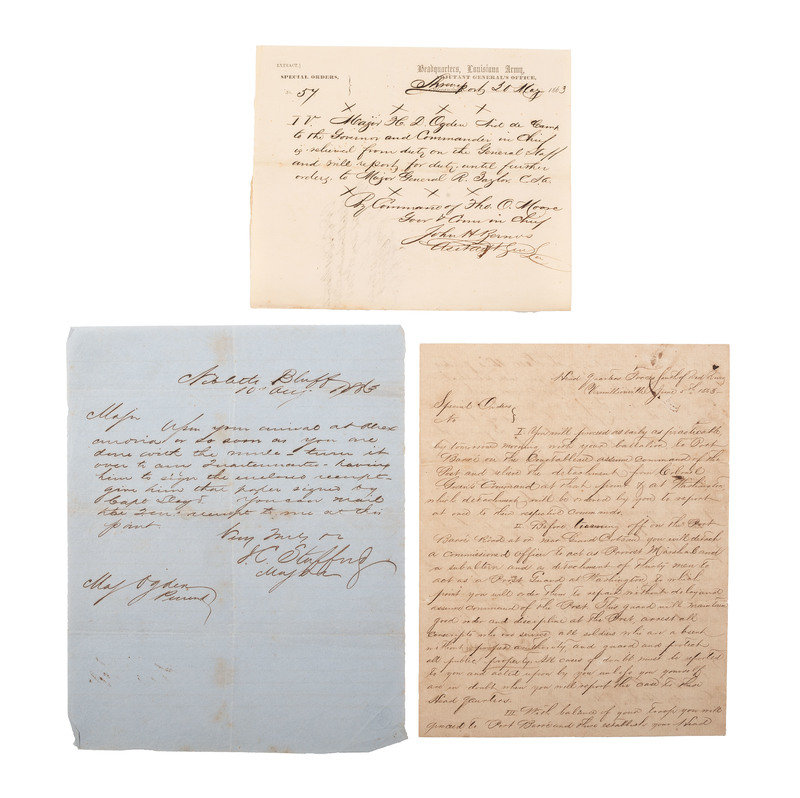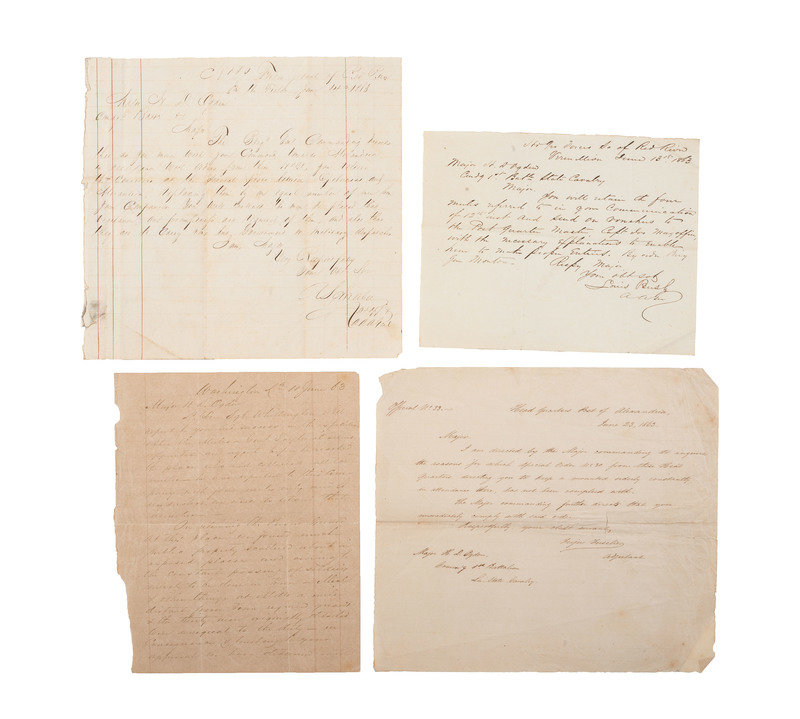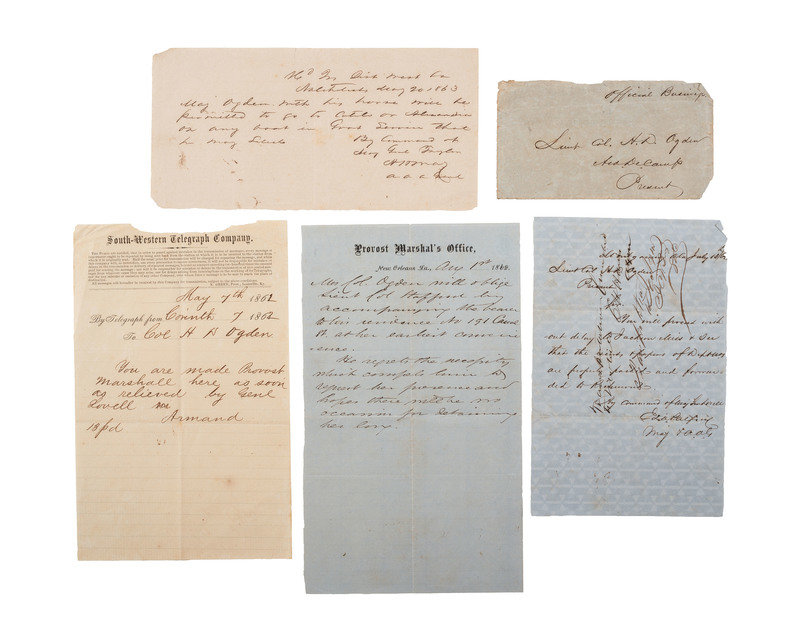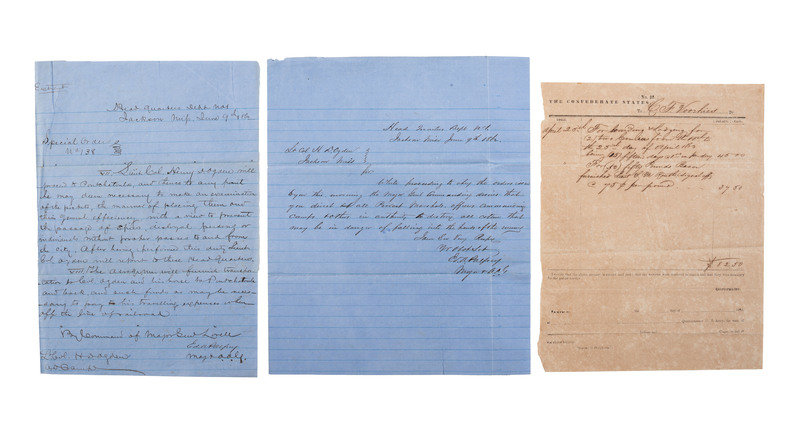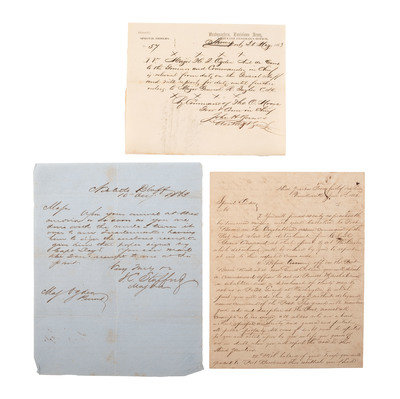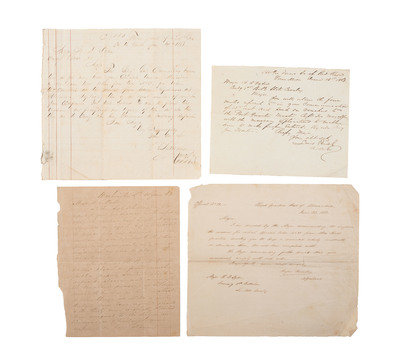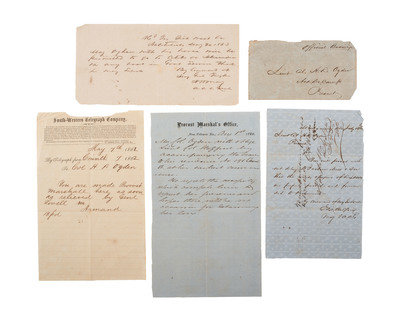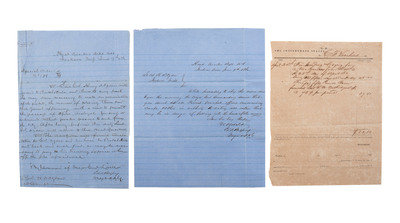In April 1861, over 1000 free men of color gathered in New Orleans with the intent of assisting the new Confederate Government in the defense of their city and formed the Louisiana Native Guard. They were accepted by Governor Thomas Moore as part of the Louisiana Militia on 2 May 1861 who also appointed Colonel Henry D. Ogden as the white commander of the regiment, whose papers are included here.
The Confederate military command, however, was uncomfortable with the concept of Black soldiers in their ranks. As a result, the regiment never received uniforms or arms, forced to procure their own resources. In January 1862, Louisiana passed legislation requiring all militiamen to be white and the Louisiana Native Guard disbanded on 16 February 1862. When the United States accepted the surrender of New Orleans on 26 April 1862, several of the former members of the Guard were approached by major General Benjamin F. Butler. At least 10% accepted his offer and formed the nucleus of the 1st Louisiana Native Guard, USA.
Upon the surrender of New Orleans, Ogden joined the staff of General Mansfield Lovell, served on Governor Moore's staff, and in various other capacities in the Trans-Mississippi Department in Northern Louisiana and Mississippi.
ARMAND. Telegraph to Col. H. D. Ogden. Corinth, MS, 7 May 1862. On South-Western Telegraph Company letterhead. "You are made Provost Marshall here as soon as relieved by Genl Lovell. -- LOVELL. Manuscript copy of Special Orders No. 138, to Ogden. Headquarters, Jackson, MS, 9 June 1862. "Lieut. Col. Henry D. Ogden will proceed to Pontchatoula, and thence to any point he may deem necessary to make an examination of the pickets." -- PALFREY, E.A. Autograph letter signed ("E.A. Palfrey"), to Ogden. Headquarters, Jackson, MS, 9 June 1862. "the Major Genl Commanding desires that you direct all Provost Marshals, officers commanding camps + other in authority to destroy all cotton that may be in danger of falling into the hands of the enemy." -- PALFREY. Autograph note signed ("E.A. Palfrey"), to Ogden. Montgomery, AL, 13 June 1862. With original envelope. "You will proceed without delay to Jackson. -- Autograph note. New Orleans, LA, 1 August 1862. On Provost Marshal's Office letterhead. "Ogden will oblige Lieut. Col. Hafferd by accompanying the bearer to his residence." -- Manuscript pass for Ogden. Natchitoches, LA, 20 May 1863. A pass from Coteau or Alexandria on any boat of government service. -- Partly printed invoice. N.p., April 1863. -- Manuscript special orders removing Ogden from duty on the General Staff. Headquarters, Louisiana Army, Adjutant General's Office, Shreveport. 30 May 1863. -- BUSH, Louis. Autograph letter signed ("Louis Bush"). Headquarters, Forces South of Red River, Vermillionville, 5 June 1863. Special orders for Ogden to "proceed to Port Barre to assume command of the post and relieve the detachment from Colonel Green's command." He continues: "You will throw out pickets by means of boats or otherwise at least 100 men as far as the banks of the Atchafalaya River with orders to harass, annoy, and if possible capture boats and transports of the enemy." -- BARRETT, W.H. Autograph letter signed ("W.H. Barrett"), to Ogden. Washington, LA, 11 June 1863. A report on the Washington, Louisiana area. -- BUSH, Louis. Autograph note signed ("Louis Bush"), to Ogden, as Commander of the 1st Batallion Louisiana State Cavalry. Vermillion, 13 June 1863. Commands for Ogden to send vouchers for four mules. -- SCHREIBER, A. Autograph letter signed. Headquarters, Forces South of Red River, In the Field, 14 June 1863. Report that Opelousas had been recaptured by Confederates after the Federals put their attention on Port Hudson. -- Manuscript orders to Ogden. Headquarters, Port of Alexandria, 23 June 1863. A reprimand and direction to "keep a mounted orderly constantly in attention." -- STAFFORD, J.C. Autograph letter signed ("J.C. Stafford"). Nibbet's Bluff, 10 August 1863. A request for Ogden to return a mule to the quartermaster. -- Together, 14 manuscript documents addressed to Ogden, condition generally very fine.
